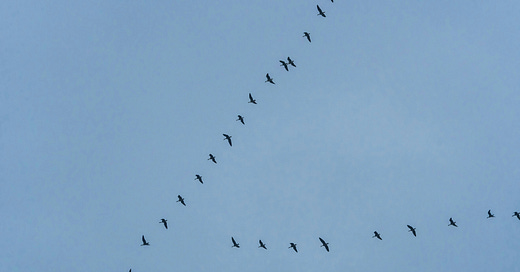A single twig breaks, but the bundle of twigs is strong.
The Canadian Geese have begun their spring migration northward. I think of them often.
Their language, both body and spoken, is awkward and bumbling. And yet, they carry a wisdom that has been honed to precision over thousands of years.
They are far more skilled at navigation than the average human, using an internal compass, celestial navigation, and environmental cues.
They are elite athletes equipped with bodies specially-tuned to cover thousands of miles over a course of weeks.
During the great migration, the geese fly in a v-shaped formation. Each bird holds its place in the formation by ancient instinct. An unspoken agreement that survival is a shared effort.
The lead bird cuts through the wind’s resistance, allowing those behind to glide with less effort, their wings beating in synchronized rhythm.
When the leader tires, another silently rises from within the ranks, seamlessly taking the front without disruption.
No single bird carries the journey alone, and no one is left behind. Every beat of their wings is a testament to endurance, unity, and the wisdom of knowing when to lead and when to follow.
In a world facing systemic crisis, rapid change, and mounting uncertainty, the pressure to do everything, be everywhere, and solve every problem can feel overwhelming.
At the heart of sustainable action lies something deceptively simple: trust.
When we trust the systems, communities, and networks around us, we can focus where we’re most effective.
Trust is about knowing what to hold onto.
Without it, every problem feels urgent, every gap yours to fill. But real impact comes from recognizing what’s not your responsibility.
It’s the difference between being effective and being everywhere.
Trust clears the mental clutter, letting you put your energy where it counts.
connection
We can learn the importance of curating our flocks from the geese.
Staying in regular conversation with people from different backgrounds and areas of expertise allows us to have a community that can step up in different scenarios.
This is critically important for the great migration.
Face-to-face interactions, whether in-person or virtual, deepen relationships and foster mutual accountability.
They also serve as reminders that we are not alone, and create opportunities to ‘learn from our elders’ (people who have been in the movement longer than us).
In our personal and professional lives, these conversations clarify where our influence lies and reinforce the idea that others are contributing their expertise in different areas.
…
In high-functioning systems—whether in nature, organizations, or communities—roles are specialized by design.
A forest thrives because every element does its job: trees grow, fungi decompose, animals disperse seeds.
No part of the system carries the entire weight. The same principle applies to meaningful work today: focus on what you do best and let others cover what they’re built for.
The idea of a single visionary leading the charge sounds heroic but rarely works in practice. Strong systems aren’t top-heavy; they’re distributed, dynamic, and adaptable.
Like the geese, we must recognize when it is our time to lead.
diversification
Trust thrives on diversity.
Organizations and communities become stronger when they are leaderful.
Many voices, many strategies, and many strengths create a robust, adaptable ecosystem.
This is not a zero-sum game: starting a new initiative doesn’t steal resources from others, it adds to the system’s overall resilience and reach.
The more people lead from their strengths, the more vibrant and powerful the collective becomes.
If you cannot find the place in the movement where your specific skills & strengths are needed, you are being called into leadership. It is time to create that space.
How many others before you found no place where they belong and gave up in frustration?
How many others after you will be searching for this space?
It is time.
trust
The most effective contributors aren’t those who take on the biggest challenges.
They’re the ones who focus where their skills have the greatest impact and actively support others in leading where they’re strongest.
Everyone has both the opportunity and responsibility to lead.
Leadership isn’t about doing everything—it’s about knowing when to step forward and when to help others step into roles where they can be most effective.
The system doesn’t need you everywhere; it needs you focused on where your strengths align with the work at hand.
Play your part, support others in playing theirs, and together, the whole becomes stronger than any individual effort.
We have thousands of miles to fly in this great migration. Take your place in the flock and prepare to lead. 🪿💕







Bri, your insights are astonishing, as is your ability to articulate them. Thank you for writing so powerfully about important concepts we all need right now. You are a healer!